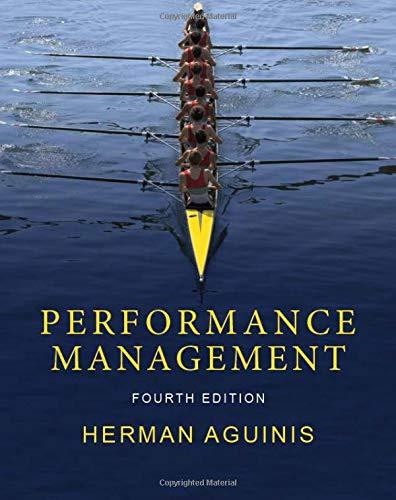The state of Georgia's Department of Human Resources (DHR) updated its performance management system. The performance management
Question:
The state of Georgia's Department of Human Resources (DHR) updated its performance management system. The performance management process is used for all employees who are to receive performance evaluations. The following outlines the critical features of this system:
- Manager training. Prior to utilizing the system, all managers receive training in how the system works and how to implement each phase of the system.
- Performance planning. This is the first step of the performance management system process and is used to create the employee's performance plan. Developing a performance plan involves identifying job and individual responsibilities and performance expectations. It is the primary responsibility of the manager to develop this plan using input from the employee that he or she may want included in the performance plan. Performance coaching. Coaching is the key supervisory activity during a performance period. It involves ongoing communication, both formal and informal, that motivates employees by letting them know where they stand in meeting expectations and carrying out responsibilities. The three steps to performance coaching are (1) observing performance; (2) providing regular performance feedback, based on information gathered through personal observation, team input, and input from the employee; and (3) documenting performance.
- Performance evaluation. This phase culminates with a meeting of the evaluating supervisor and the employee to rate performance and discuss appropriate salary increases and developmental planning for the employee.
- Performance development. Supervisors should discuss performance development with each employee. A developmental plan must be developed for each employee who is rated "does not meet expectations" or "needs improvement" in the area of Employment Terms and Conditions. The structured approach of the developmental plan has three objectives (1) to enhance employee strengths, (2) to decrease employee areas that need improvements, and (3) to meet organizational and team needs.
- Salary increase. Salary increases are awarded annually to each eligible employee. To be eligible for a performance-based salary increase, employees must:
a Receive an overall rating for Job and Individual Responsibilities of at least "met expectations."
- Receive an overall rating for Terms and Conditions of Employment of at least "needs improvement."
- Salary increases for each evaluation period for employees who "met or exceeded expectations" are restricted to the following guidelines:
- An overall rating of "met expectations" will receive a standard increase, based on the amount identified for the evaluation period.
- An overall rating of "exceeded expectations" will receive a standard increase as noted above, along with a lump sum identified for the evaluation period.
- Each year, a specified amount of money is set aside for salary increases. Because funds are limited, the salary increase amounts may be reduced if the department exceeds the allocated funds. If the salary increase amounts must be reduced, the reduction percentage will be the same for all employees.
- Unless otherwise authorized, employees at or above pay grade are not eligible for a performance-based salary increase, and employees who are near the pay grade maximum will be granted an increase to the pay grade maximum only.
The performance management and reward system, as currently in place, focuses mainly on individual performance. But given the changing nature of work that is now team-based in many different units and departments, there is a need to revise the system so that it can accommodate team-based rewards. Please answer the following questions:
1. How would you revise the system to include team-based rewards?
2. What are some of the anticipated challenges in including a team-based reward component, given the nature of the organization and its customers?
3. Given the effectiveness of contingent pay plans for teams, what are your recommendations on how to implement this type of system in this particular organization?
Step by Step Answer:






